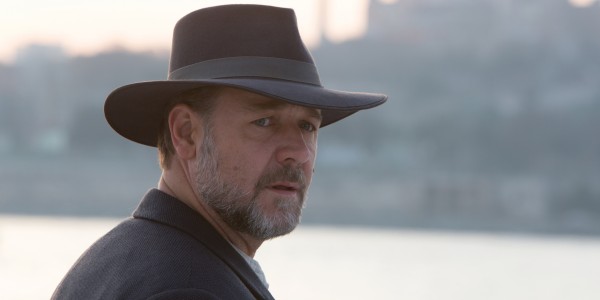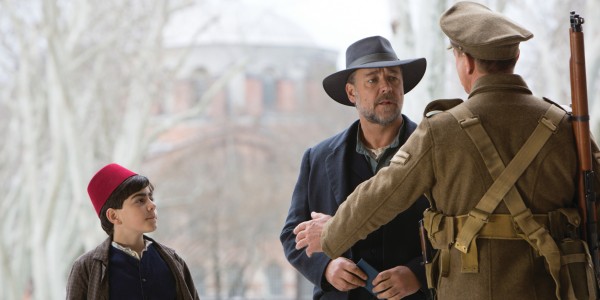The Water Diviner Review
"An old-fashioned debut by an old-fashioned movie star"
Clint Eastwood, Kevin Costner, Mel Gibson, Tommy Lee Jones, Ben Affleck, Angelina Jolie… - the list of Hollywood stars who have had a go at directing is long. Now Russell Crowe joins their ranks with his historical drama
The Water Diviner. His directorial debut arrives with some pedigree, as it shared
the award for best picture at the Australian AACTA Awards with Jennifer Kent’s excellent The Babadook.

The film begins with a vicious battle sequence. It is 1915 and we are on the Turkish peninsula Gallipoli, where the crumbling Ottoman Empire celebrates one of its final victories against the Allies during the First World War. The next scene takes place four years later in the Australian outback, where we see our protagonist Connor (Russell Crowe) digging a well in the company of his dog. Connor's existence is dominated by grief. His three sons were lost on the battlefield in Gallipoli on the same fateful day. When his wife, unable to cope with this tragic loss, eventually commits suicide, the farmer travels across the world to find his children.
His journey is very much like digging a well in the desert: a dry hole in the sand is not an unlikely outcome. The British authorities certainly seem to think so. After the fall of the Ottomans, they are now in charge of the politically unstable region. Amidst the post-war reconstruction, political negotiations and a growing nationalist uprising, a father looking for his sons is not a priority. But Connor refuses to take no for an answer and travels to Gallipoli without the necessary permits. Here he manages to find some answers and makes an unlikely ally in Major Hasan (Yilmaz Erdogan), an officer of the defeated Ottoman army. During his stays in Istanbul he begins to form a connection with a Turkish widow (former Bond-girl Olga Kurylenko) and her son.
The Water Diviner is unashamedly old-fashioned. The storyline feels familiar and surprising moments are a rare commodity. The audience always knows where the film is going, which is perfectly acceptably within the genre of period drama. Fortunately, it is mostly reassuring rather than boring in this case. This is helped by a strong, understated leading performance by Russell Crowe. He leaves the macho-madness of
Noah and that terrible Irish accent from
A New York Winter's Tale behind to create a calm, emotional screen-presence. Crowe matches this effort behind the camera, conveying his passion for the subject matter.

The interesting things happen on the fringes of the plot.
The Water Diviner delves into a fascinating period of history and takes a unusual position. The film demonstrates respect and affection for its Turkish characters and their culture. Even though they are essentially the enemy, the Turks prove much more understanding and helpful than the British. As a result, Connor gets pulled into the continuing conflict between the Turks and the Greeks.
The Water Diviner thus tells its story from the perspective of the losers and the (from a Western point of view) foreigners, which is unusual and interesting. Olga Kurylenko's character meanwhile serves as a critique of the dominant patriarchy. This somewhat makes up for the fact that the romance between her and Russell Crowe feels like an unnecessary appendix added to increase the film's mainstream appeal.
The Water Diviner's only major flaw is it's constant, lazy use of flashbacks during the first half. Crowe keeps returning to brutal scenes of warfare which add nothing but noise and melodrama. We are able to understand Connor's pain without these sequences and they interrupt rather than enhance the flow of the narrative.
The Water Diviner nevertheless marks a promising debut for Crowe. Though you will not find any new ideas or artistic flashes, it delivers a moving, old-fashioned night at the pictures.
Pros
- Nuanced depiction of the Turks
- Russel Crowe’s understated central performance
- David Hirschfelder’s score
Cons
- Overreliance on flashbacks
- Romance shoehorned in
- Lack of surprise and new ideas
 The film begins with a vicious battle sequence. It is 1915 and we are on the Turkish peninsula Gallipoli, where the crumbling Ottoman Empire celebrates one of its final victories against the Allies during the First World War. The next scene takes place four years later in the Australian outback, where we see our protagonist Connor (Russell Crowe) digging a well in the company of his dog. Connor's existence is dominated by grief. His three sons were lost on the battlefield in Gallipoli on the same fateful day. When his wife, unable to cope with this tragic loss, eventually commits suicide, the farmer travels across the world to find his children.
His journey is very much like digging a well in the desert: a dry hole in the sand is not an unlikely outcome. The British authorities certainly seem to think so. After the fall of the Ottomans, they are now in charge of the politically unstable region. Amidst the post-war reconstruction, political negotiations and a growing nationalist uprising, a father looking for his sons is not a priority. But Connor refuses to take no for an answer and travels to Gallipoli without the necessary permits. Here he manages to find some answers and makes an unlikely ally in Major Hasan (Yilmaz Erdogan), an officer of the defeated Ottoman army. During his stays in Istanbul he begins to form a connection with a Turkish widow (former Bond-girl Olga Kurylenko) and her son.
The Water Diviner is unashamedly old-fashioned. The storyline feels familiar and surprising moments are a rare commodity. The audience always knows where the film is going, which is perfectly acceptably within the genre of period drama. Fortunately, it is mostly reassuring rather than boring in this case. This is helped by a strong, understated leading performance by Russell Crowe. He leaves the macho-madness of Noah and that terrible Irish accent from A New York Winter's Tale behind to create a calm, emotional screen-presence. Crowe matches this effort behind the camera, conveying his passion for the subject matter.
The film begins with a vicious battle sequence. It is 1915 and we are on the Turkish peninsula Gallipoli, where the crumbling Ottoman Empire celebrates one of its final victories against the Allies during the First World War. The next scene takes place four years later in the Australian outback, where we see our protagonist Connor (Russell Crowe) digging a well in the company of his dog. Connor's existence is dominated by grief. His three sons were lost on the battlefield in Gallipoli on the same fateful day. When his wife, unable to cope with this tragic loss, eventually commits suicide, the farmer travels across the world to find his children.
His journey is very much like digging a well in the desert: a dry hole in the sand is not an unlikely outcome. The British authorities certainly seem to think so. After the fall of the Ottomans, they are now in charge of the politically unstable region. Amidst the post-war reconstruction, political negotiations and a growing nationalist uprising, a father looking for his sons is not a priority. But Connor refuses to take no for an answer and travels to Gallipoli without the necessary permits. Here he manages to find some answers and makes an unlikely ally in Major Hasan (Yilmaz Erdogan), an officer of the defeated Ottoman army. During his stays in Istanbul he begins to form a connection with a Turkish widow (former Bond-girl Olga Kurylenko) and her son.
The Water Diviner is unashamedly old-fashioned. The storyline feels familiar and surprising moments are a rare commodity. The audience always knows where the film is going, which is perfectly acceptably within the genre of period drama. Fortunately, it is mostly reassuring rather than boring in this case. This is helped by a strong, understated leading performance by Russell Crowe. He leaves the macho-madness of Noah and that terrible Irish accent from A New York Winter's Tale behind to create a calm, emotional screen-presence. Crowe matches this effort behind the camera, conveying his passion for the subject matter.
 The interesting things happen on the fringes of the plot. The Water Diviner delves into a fascinating period of history and takes a unusual position. The film demonstrates respect and affection for its Turkish characters and their culture. Even though they are essentially the enemy, the Turks prove much more understanding and helpful than the British. As a result, Connor gets pulled into the continuing conflict between the Turks and the Greeks. The Water Diviner thus tells its story from the perspective of the losers and the (from a Western point of view) foreigners, which is unusual and interesting. Olga Kurylenko's character meanwhile serves as a critique of the dominant patriarchy. This somewhat makes up for the fact that the romance between her and Russell Crowe feels like an unnecessary appendix added to increase the film's mainstream appeal.
The Water Diviner's only major flaw is it's constant, lazy use of flashbacks during the first half. Crowe keeps returning to brutal scenes of warfare which add nothing but noise and melodrama. We are able to understand Connor's pain without these sequences and they interrupt rather than enhance the flow of the narrative. The Water Diviner nevertheless marks a promising debut for Crowe. Though you will not find any new ideas or artistic flashes, it delivers a moving, old-fashioned night at the pictures.
The interesting things happen on the fringes of the plot. The Water Diviner delves into a fascinating period of history and takes a unusual position. The film demonstrates respect and affection for its Turkish characters and their culture. Even though they are essentially the enemy, the Turks prove much more understanding and helpful than the British. As a result, Connor gets pulled into the continuing conflict between the Turks and the Greeks. The Water Diviner thus tells its story from the perspective of the losers and the (from a Western point of view) foreigners, which is unusual and interesting. Olga Kurylenko's character meanwhile serves as a critique of the dominant patriarchy. This somewhat makes up for the fact that the romance between her and Russell Crowe feels like an unnecessary appendix added to increase the film's mainstream appeal.
The Water Diviner's only major flaw is it's constant, lazy use of flashbacks during the first half. Crowe keeps returning to brutal scenes of warfare which add nothing but noise and melodrama. We are able to understand Connor's pain without these sequences and they interrupt rather than enhance the flow of the narrative. The Water Diviner nevertheless marks a promising debut for Crowe. Though you will not find any new ideas or artistic flashes, it delivers a moving, old-fashioned night at the pictures.